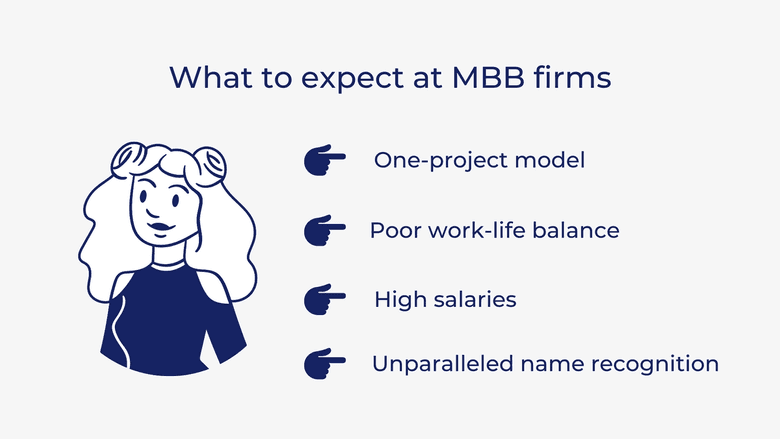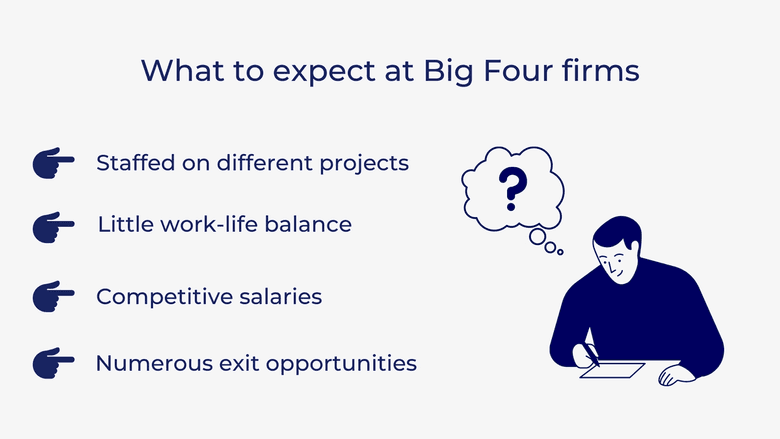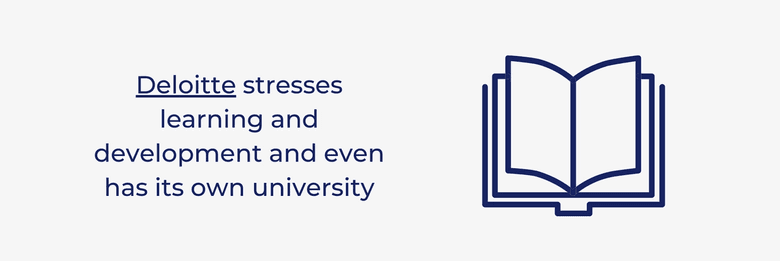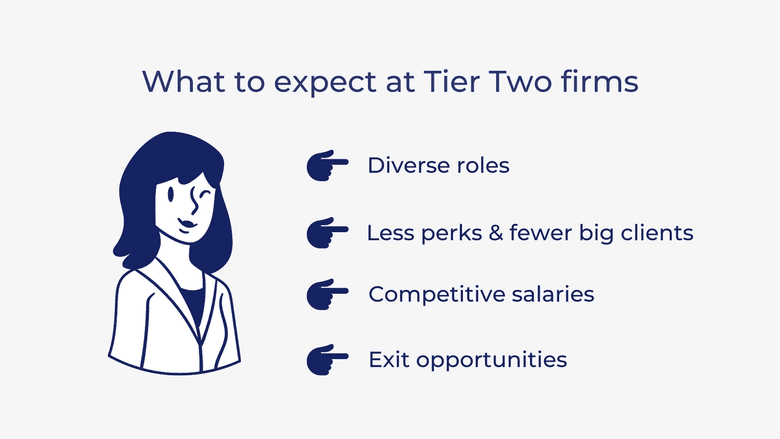A Complete Guide to Top Management Consulting Firms
With so many prestigious options to choose from, which firm is right for you?
Consulting is one of the most prestigious industries in the world. Every year, top firms attract some of the brightest young minds from name-brand universities. Thousands of people apply, but only a few are selected for these coveted roles.
Preparing for consulting recruitment is kind of like applying to colleges. Firms have low acceptance rates and high barriers to entry. Each has a distinct set of values, a unique culture, and a host of factors they look for in candidates. And, of course, while they evaluate you on these dimensions, you have to evaluate them too.
You'll spend lots of time figuring out which firms to apply to and, ultimately, which one is right for you. This article will give you somewhere to start. I'm breaking down MBB, The Big Four, and Tier Two consulting firms. I'll give you a taste of the work they do, their culture, and the travel/work-life balance you can expect from each company.
Please note that management consulting firms specialize in many areas, from technology consulting (e.g. IBM or Capgemini) to human resources (e.g. Mercer or Aon). This article will only focus on firms with a broader scope of work and a strong strategy practice.
MBB ("The Big Three")

MBB (McKinsey, Bain, and BCG) are often touted as the most prestigious consulting firms in the world. With staggeringly low acceptance rates of ~4%, candidates must work hard to get their foot in the door. Among the laundry list of qualifications includes a high GPA (think: 3.5+), a "top tier" diploma, an interesting background, and an uncanny ability to solve business problems.
Like may management consulting firms, each offers a variety of services (from operations to M&A) and works with a variety of industries (from healthcare to financial services). MBB often works with Fortune 100 & Fortune 500 companies, although Fortune 1000, private equity firms, governmental entities, and nonprofits also make the list. All three consulting companies have a one-project staffing model, meaning that employees are only assigned to one client at a time.
With that in mind, MBB consultants are expected to dedicate 110% to that project. Work-life balance is notoriously poor at these firms, with 60-70 hour weeks being the norm. All of that work does pay off (literally)-- starting salary for undergraduates hovers around $90K, while MBA graduates will make around $165K. Standard benefits, like healthcare and 401K, are above average.
Finally, the exit opportunities are unparalleled. Many ex-MBB consultants go on to become Fortune 500 CEOs or VPs, successful entrepreneurs, and venture capitalists.
Although these three firms rank similarly in prestige, compensation, and client work, there are a few things that set them apart.
Bain & Company

What kind of work can I expect?
Bain focuses heavily on strategy and prides themselves on taking challenging projects. They are especially well-versed in the private equity space, where clients appreciate their results-oriented approach and willingness to take risks. You will not be expected to choose a specialty until late in your career, meaning you'll work on a variety of projects for most of your time at Bain.
What is the culture like?
Among MBB, Bain tends to be a favorite in terms of culture. Because of their local staffing model (see below), each office is very tight-knit and teamwork-oriented. In fact, they live by the idea that "a Bainie never lets another Bainie fail." It serves as a professional safety net, wherein coworkers will help each other fix mistakes or address difficult situations.
Employees also enjoy the "work hard, play hard" mentality of the firm. Bainies are expected to put in their time, even working themselves to the point of burnout. However, once the work day is over, they love to hang out with their coworkers. Bain's culture is known for being a bit "fratty," meaning those hang outs might include a drink or a party.
How is the travel?
Like many management consulting firms, Bain runs on a 4-day-a-week travel schedule: consultants work at the client site Monday-Thursday and spend Friday in their home office. However, Bain's local staffing model stands out: each office's client base is local or regional, and most teams are made up of people from the same office. This also means that your international travel will be limited-- many projects will let you stay close to (or at) home.
Boston Consulting Group (BCG)

What kind of work can I expect?
BCG places a strong emphasis on growth and innovation, and excels at projects that require a lot of idea generation. They take a customized approach to each client and expect creativity from their employees. BCG serves fewer industries than their MBB counterparts, hoping to specialize in each one of them.
In addition to its consulting services, BCG is known for insights like the Growth/Share Matrix. This model sorts products into four quadrants based on their (a) growth rate and (b) market share, and provides advice on how to treat each category.
What is the culture like?
BCG's focus on innovation means that they hire creative thinkers with entrepreneurial mindsets. Employees should expect to push the status quo and challenge their coworkers, all well maintaining the spirit of comradery the firm values. This spirit is proven through BCG's numerous social events and flat hierarchy, encouraging communication and bonding among people of all levels.
Although they value teamwork, BCG is an even bigger advocate of individuality. While many firms expect new hires to "fit in," BCGers are encouraged to look, act, and work according to their preferences.
Like any top management consulting firm, the environment is high pressure. However, some employees say that BCG's emphasis on perfection and customization make it even worse. Creating unique plans and doubling down on quality control can lead to slow, painstaking work.
How is the travel?
BCG's travel schedule is pretty typical of consulting firms: Monday-Thursday with some regional travel, some international travel. They staff regionally as much as possible, but depending on which employees are free (and qualified) for projects, international travel will likely be a part of the experience.
McKinsey & Company

What kind of work can I expect?
McKinsey is especially well-known for their strategy work, but also excels in operations and organizational change. They offer a smaller range of services ("functions") than Bain or BCG, but has a deep understanding of how each industry ties to each function. Industry-wise, McKinsey excels in education and the public sector.
"The McKinsey Way" denotes a structured, somewhat pre-determined approach to work. This means that employees pull from McKinsey's expertise when solving client problems, rather than delivering heavily customized solutions. Some say this limits creativity, while others appreciate the consistent production of high quality work.
This firm strives to hire the best and brightest from all backgrounds. For example, a brilliant medical student may be hired to work in the healthcare practice, despite having no prior consulting experience. With this in mind, it's no surprise that many McKinsians specialize in an industry or function early on.
What is the culture like?
McKinsey has a "one firm" mentality, which unites employees under consistent training, values system, and culture across branches. This means that consultants from any office, worldwide, can come together and seamlessly work as a unit. It also means that McKinsians present a united front and feel a deep sense of loyalty toward the company and their peers.
The organization is relatively business-like, with a formal structure and professional relationships between colleagues. The firm claims to prioritize intellect over experience, although in reality, both are typically required to get your foot in the door. McKinsians are often described as smart, likable, ambitious, and incredibly well-accomplished.
McKinsey is heavily feedback-oriented, for employees are held to a high performance standard and corrected if they don't meet it. This contributes to a fairly high stress environment that some even describe as a "pressure cooker."
How is the travel?
Due to McKinsey's global philosophy, client teams are formed across offices worldwide. One team member may come from the New York office, another from London, and a third from Tokyo. This means that travel outside your region is frequent and most McKinsians are on-site Sunday or Monday-Thursday.
The Big Four

The Big Four make up a large percentage of consulting industry annual revenue, simply because of their massive size. The largest of these firms, Deloitte, employs over 330,000 people worldwide. These organizations started as accounting firms, acquiring strategy consulting firms and building advisory practices as they grew. Today, each of them offer a range of professional services, including legal, tax, audit, and risk advisory.
Within their consulting practices, life looks a little different than at MBB. Clients fall into a similar degree of prestige, but Big Four firms may be staffed on different projects. While plenty of their work falls within the strategy realm, many of their projects also revolve around implementation. For example, a team of management consultants may build a growth strategy plan for the client. Then, after getting approval, they will work on-site with relevant parties to ensure the plan is properly executed. This also means that some projects may last 6-12 months (rather than the traditional 2-4 months in strategy).
Work-life balance is still poor, but is often a step up from the Big Three firms. Some weeks may require fewer hours and getting staffed on a local project may be easier. Salaries and benefits are competitive with MBB, with most entry-level positions falling in the $75-90K range for undergraduates.
Exit opportunities are numerous and Big Four names are recognized throughout the business world. Some alumni go on to lead boutique firms or start their own businesses. Others become directors, VPs, or SVPs at Fortune 500 companies. It's important to note that these alumni networks are not as tight-knit as MBBs', so finding a job from networks alone will require a little extra effort.
Deloitte Consulting: S&O Practice

What kind of work can I expect?
Deloitte's consulting arm has three prestigious practice areas: Strategy & Operations, Human Capital, and Technology. They have the largest consulting practice of the Big Four and attract a wide range of clients and projects.
Since their acquisition of Monitor in 2013, Deloitte has seen an uptick in strategy projects. However, you can generally expect a healthy mix of strategy (higher level, shorter term) and operations (implementation-based, longer term) projects. Strategy projects are said to be more interesting, but the hours are generally longer.
Deloitte's staffing model is almost entirely networking based, which can be difficult to navigate at a big firm. Start building relationships right away so you can work on projects that interest you.
What is the culture like?
Deloitte doesn't have a highbrow, intellectual feel like McKinsey. Rather, the firm has been described as unstuffy and somewhat fratty. Depending on who you ask, this can feel like a cliquey "boys club" or a laidback, familial environment.
According to reviews on Glassdoor, most employees are friendly, collaborative, and always willing to lend a hand. However, be wary of office politics-- some folks complain of complex dynamics with higher-ups and unspoken social rules that you need to learn early on.
This firm puts a huge emphasis on learning and development. In fact, they're one of few firms with a world-class training facility called Deloitte University. New employees are flown out to the DU campus every year to learn, collaborate, and get to know one another.
How is the travel?
Since the firm is large and projects are varied, you won't always be on the road. For the most part, however, Deloitte follows a traditional Monday-Thursday travel schedule. If that's the case, Fridays tend to be pretty laid back, with some employees opting to work from home or attend after work social events. On more intense projects, you may be required to stay at the client site through Friday.
Ernst & Young (EY): Parthenon

What kind of work can I expect?
As the strategy consulting arm of EY, Parthenon works exclusively on strategy projects. They hope to help clients reach their full potential, meaning that growth or restructuring are common project components. Employees will also do their share of due diligence work, since the firm has a large private equity practice.
They also work with a lot of Global 1000 companies and startups (or small companies) with high growth potential.
Since they bill their clients per-project instead of per-hour worked (like most consulting firms), work-life balance has the potential to exist. This assumes, of course, that employees work efficiently each day and don't run into any major roadblocks.
What is the culture like?
EY's ideal employee personality is simple yet timeless: "smart, nice, and driven." They emphasize these traits throughout their recruitment process and most folks at the firm are said to possess them. Since the firm is rather small and less travel-heavy, employees spend a lot of time together in the office. This means personality is important and it helps contribute to EY's tight-knit, familial feel.
It's important to note that formal mentorship is somewhat difficult to come by here, despite the easy access to higher ups. If you want one-on-one time, you will need to make a concerted effort to get to know senior employees.
How is the travel?
As previously mentioned, EY employees travel less than those at other firms. This is because of their large private equity practice, which doesn't require as much time on-site. However, if you're staffed on a project outside of that industry, expect a standard Monday-Thursday travel schedule. Travel is typically regional.
KPMG: Global Strategy practice

What kind of work can I expect?
Unlike the rest of the Big 4, KPMG has not acquired a boutique strategy firm of its own. The work you'll do here has much more variety than other big 4 firms, from laidback risk projects to fast-paced growth strategy. Since they don't have distinct strategy arm, you can expect operations and implementation-based work.
Since they're relatively low-profile, you might not expect KPMG's expansive and prestigious client portfolio. But don't discount this firm-- they work with a ton of Fortune 50 companies and other brand-name corporations.
Among top management consultancies, KPMG has some of the best work-life balance. If you remain diligent, taking on no more than you can handle, it's possible to have a life outside of the office. (Remember that in consulting, "work-life balance" is relative-- you'll still be working 50 hour weeks, minimum).
What is the culture like?
Learning is an integral part of KPMG's culture, with a strong commitment to employees' personal and professional development. They have a database of almost 3000 professional education courses for consultants to browse at their leisure.
Their culture values the individual. Unlike many major firms, there isn't a lot of pressure to fit in or confirm to a company-wide attitude. They embrace individuality, authenticity, and even a bit of quirkiness. Colleagues describe one another as curious, intelligent, and always willing to lend a helping hand. This is a firm where people rave about their coworkers, which says a lot for the environment KPMG has created.
How is the travel?
Travel at KPMG is fairly standard, with Monday-Thursday being spent on client sites. Some consultants choose to fly out Sunday, depending on their project and preferences, and the firm is accommodating of these requests.
PricewaterhouseCoopers (PwC): Strategy&

What kind of work can I expect?
Like Deloitte, PwC has a wide range of consulting services. In recent years, they acquired their strategy consulting arm, Strategy&, formerly known as Booz & Company.
As the name implies, projects are strategy-based, which means shorter timelines and a near absence of implementation-based work. Most employees report that the projects keep them on their toes, spanning a range of industries and functional areas. "Interesting projects" is one of the most stated terms on Glassdoor!
Some employees complain that the firm is less innovative than it used to be. Since it was acquired by PwC, Strategy& has dealt with a lot more red tape, meaning it can't be as agile as it used to be. However, they still stand out in the innovation department due to their think tanks. As described on Vault.com:
"The firm's think tank, the Katzenbach Center, is a center for excellence in the areas of organizational culture and leadership, the informal organization, and motivation. And, in the Middle East, it has The Ideation Center, a think tank that aims to promote sustainable growth in the region by helping leaders across sectors translate socioeconomic trends into actions and better business decisions."
What is the culture like?
Although Strategy&'s culture has shifted since it was acquired by PwC, many employees still have positive things to say. The firm has attempted to retain its focus on learning and career advancement, fueled by a desire to push employees to improve. Authenticity and integrity are at the core of the company's values, and they encourage employees to bring their true selves to work. Many describe their coworkers as smart, collaborative, and humble.
Some say that, while the firm tries to put culture first, it needs some work. Since becoming part of PwC, Strategy& has struggled to sustain its own identity and rebuild a strong culture. Competition among employees is said to make the problem even worse.
How is the travel?
Strategy& is known for attempting to prioritize work-life balance (whether they've succeeded, we can't be sure). Travel-wise, this means employees are more likely to be staffed on regional projects, although traveling further is still somewhat common.
Tier Two

Tier Two firms hold a similar level of prestige as the Big Four. However, unlike the Big Four, most of these firms do not offer accounting services. In fact, they are quite diverse: for example, Accenture has 500,000+ employees and a massive focus on technology-driven solutions. At the same time, Kearney has about 3,500 employees and is known for their work in sourcing, procurement, and operations. Like other firms on this list, each still gets recognition for their strategy practices.
These companies are comparable to the Big Four in terms of salary and exit opportunities. Most undergraduates earn a starting salary in the $75-90K range and, upon leaving the firm, take a number of diverse career paths.
Tier Two firms, overall, differ on only two metrics: price and prestige.
- Price: They charge their clients lower rates than MBB firms. This may mean (a) fewer clients are massive, brand name companies-- those who can afford MBB will often pay for them, and (b) a lack of crazy perks, like first class flights to every client site (but don't worry, you'll still be well taken care of)
- Prestige: While these firms will look good on any resume, they don't care the same brand recognition and jaw-dropping reputation that MBB does. This doesn't mean your work will be any less rewarding or important-- in fact, the exact opposite may be true. Just be aware of this before signing your offer. If you're only in consulting for the clout, these firms may not be the right choice for you
Accenture Strategy

What kind of work can I expect?
Better known for their massive Technology practice, Accenture has a small but mighty strategy arm. Even on the strategy side of the business, Accenture focuses on digital or technologically advanced solutions.
At this firm, employees notoriously get a variety of projects. Accenture services 40+ different industries and a range of brand-name companies. In fact, they work with 91 of the fortune 100 companies! Needless to say, few employees leave because of monotonous assignments.
Expect work-life balance to fluctuate more than at other firms: some projects will require 40 hour work weeks, while others will require 70.
What is the culture like?
Since Accenture is such a massive firm, there is no unified culture to tie each office and practice together. Instead, Accenture prides themselves on having a "culture of cultures." Under this model, they allow groups to develop their own cultures and instead focus on reinforcing company values.
So what are Accenture's values? Fairness, openness and honesty, equality, and stewardship, to name a few. And, according to employees, these values are upheld on a daily basis throughout the organization. Within the strategy practice, the environment is said to be tight-knit, collegial, and team-oriented.
A downside of Accenture's size is its slow-moving, bureaucratic nature. This means that the strategy arm has a difficult time being agile and innovative, even though it is theoretically small enough to change quickly.
How is the travel?
Most Accenture consultants are on the road most of the time, with 80-100% of weeks involving travel. This firm follows a typical Monday-Thursday travel schedule, where employees fly to client sites Monday and return home Thursday. Fridays are spent working in their home office.
Like McKinsey, Accenture has a global travel model, where consultants can be staffed anywhere in the world.
Kearney (formerly A.T. Kearney)

What kind of work can I expect?
Although Kearney's strategy practice remains strong, they are better known for their work in sourcing, procurement, and operations consulting.
There's a steep learning curve at first, but some employees report that the work gets repetitive once you adjust to the firm.
Kearney is one of few major firms that doesn't use the "up or out" model, where consultants must either be promoted or fired within a certain period of time. They allow employees to progress at their own pace and don't require MBAs.
What is the culture like?
Kearney values collaboration and an entrepreneurial spirit, and employees are said to reflect these traits well. People at this firm work incredibly hard and lend a helping hand whenever they can. The typical employee is also very friendly and down to earth.
New hires are given a lot of responsibility from day one. They get more client exposure than most folks starting out in the consulting world. Additionally, mentorship is easy to come by-- more experienced employees are happy to guide and interact with younger ones.
How is the travel?
Kearney is notorious for having one of the worst travel schedules in the industry. Employees fly to client sites on Sundays and travel back to their home offices on Fridays.
L.E.K Consulting

What kind of work can I expect?
LEK is best known for its Mergers and Acquisitions work, plus its impact on both the private equity space and healthcare industry. In addition to strategy projects, Due Diligence/PE work takes up a fair amount of employees' time.
LEK's "cheaper and faster" model of projects appeals to a lot of clients, but can lead to burnout. Expect to move through clients quickly, with little time to catch your breath between projects. The hours here are some of the worst in the industry, with 65-70 hour weeks as the norm.
What is the culture like?
Although the work is intense, the culture is reportedly strong and positive. There is an emphasis on fostering relationships with coworkers and collaborating throughout all stages of the project.
New hires are given a lot of responsibility and trust right away. The learning curve is steep but most employees enjoy the challenge, for LEK hires tenacious and intelligent people. Additionally, the firm provides a lot of training and professional development opportunities to ease the burden.
How is the travel?
LEK employees travel very little. This helps develop a stronger community within each office, but takes away from the "global" feel that a firm like McKinsey provides.
Oliver Wyman

What kind of work can I expect?
Oliver Wyman serves a lot of Global 1000 companies, but is best known for its work in the financial services industry. They work with 80 of the world's largest 100 financial institutions. In addition to providing consulting services, they help with risk, asset management, insurance, and more.
People of all levels make important contributions to each project. The hierarchy of the firm feels rather flat, since partners and first-year employees will work side by side on deliverables. Clients are also encouraged to contribute. Oliver Wyman has a clear "quality over quantity" motto, meaning that pointless/busy work is less common.
Like Kearney, Oliver Wyman doesn't use the "up or out" model. They don't require MBAs and have one of the fastest paths to partner in the industry.
What is the culture like?
Oliver Wyman is big on professional development. They see every new hire as having partner-potential, and work to grow their employees' skill sets accordingly. Like many consulting firms, new employees are assigned an advisor and a mentor, but mentorship is truly prioritized here.
This firm boasts an entrepreneurial attitude and, depending on who you ask, they may follow through or they may fall short on this claim. They try to hire risk takers, self starters, and folks with a lot of ambition. In this high-performance culture, idea generation and strong interpersonal skills will help you get ahead.
How is the travel?
Like McKinsey and Accenture, Oliver Wyman has a global staffing model, meaning that consultants are put on projects around the world. For the most part, they have a standard Monday-Thursday travel schedule, with Fridays in the home office.
Roland Berger

What kind of work can I expect?
This firm has a bit of an old-world reputation, which translates to the range of clients they serve. They're best known for their work with industrial clients, especially automobile and capital goods companies.
The majority of employees describe the projects as interesting and relatively diverse. Even junior team members should expect client-facing work and a lot of responsibility. Roland Berger places a ton of trust in everyone they hire.
One complaint about the work is the staffing process. According to some employees, trying to find a new project can be slow and frustrating.
What is the culture like?
Roland Berger's culture is built on entrepreneurship, excellence, and empathy. People appear to take these values seriously, and many members of this firm rave about their colleagues. The overall consensus is that the people are fun and don't take themselves too seriously, but are highly professional when they need to be.
This firm makes a concerted effort to facilitate bonds between employees. Each office has their own go-to social events and, each Friday, they host discussions about business developments and share good news.
How is the travel?
Travel at Roland Berger is pretty typical of the consulting industry. They have a blend of regional and international projects and are on-site Monday-Thursday.
The information provided herein is for general informational purposes only and is not intended to provide tax, legal, or investment advice and should not be construed as an offer to sell, a solicitation of an offer to buy, or a recommendation of any security by Candor, its employees and affiliates, or any third-party. Any expressions of opinion or assumptions are for illustrative purposes only and are subject to change without notice. Past performance is not a guarantee of future results and the opinions presented herein should not be viewed as an indicator of future performance. Investing in securities involves risk. Loss of principal is possible.
Third-party data has been obtained from sources we believe to be reliable; however, its accuracy, completeness, or reliability cannot be guaranteed. Candor does not receive compensation to promote or discuss any particular Company; however, Candor, its employees and affiliates, and/or its clients may hold positions in securities of the Companies discussed.
